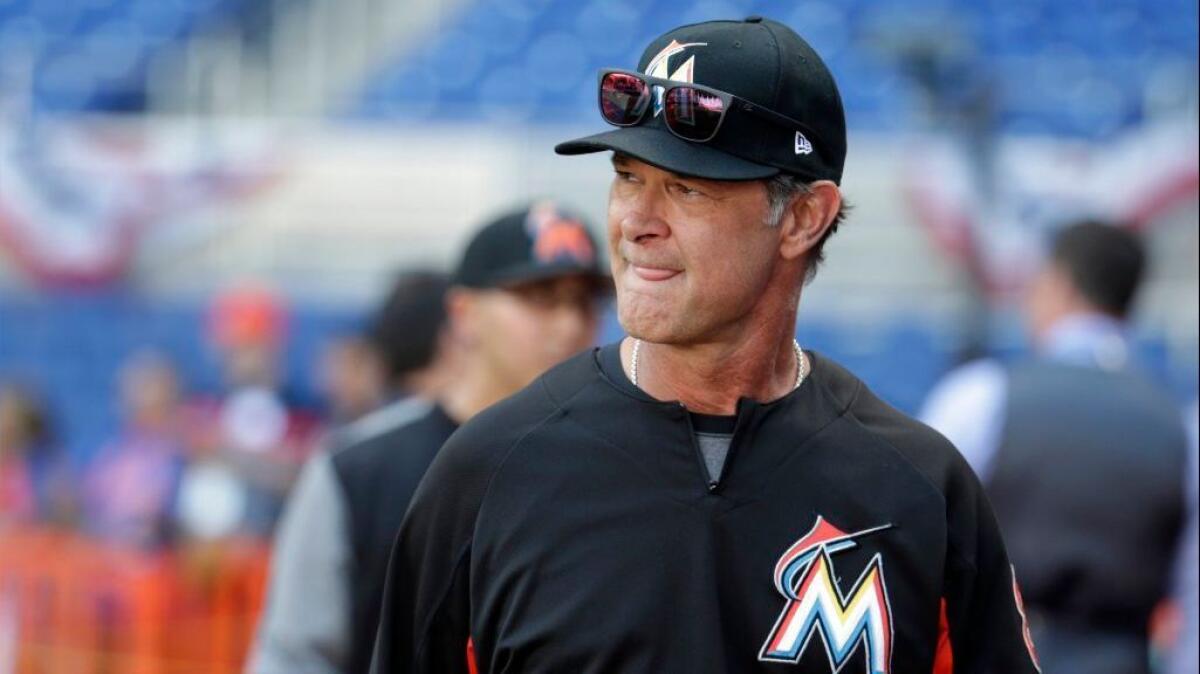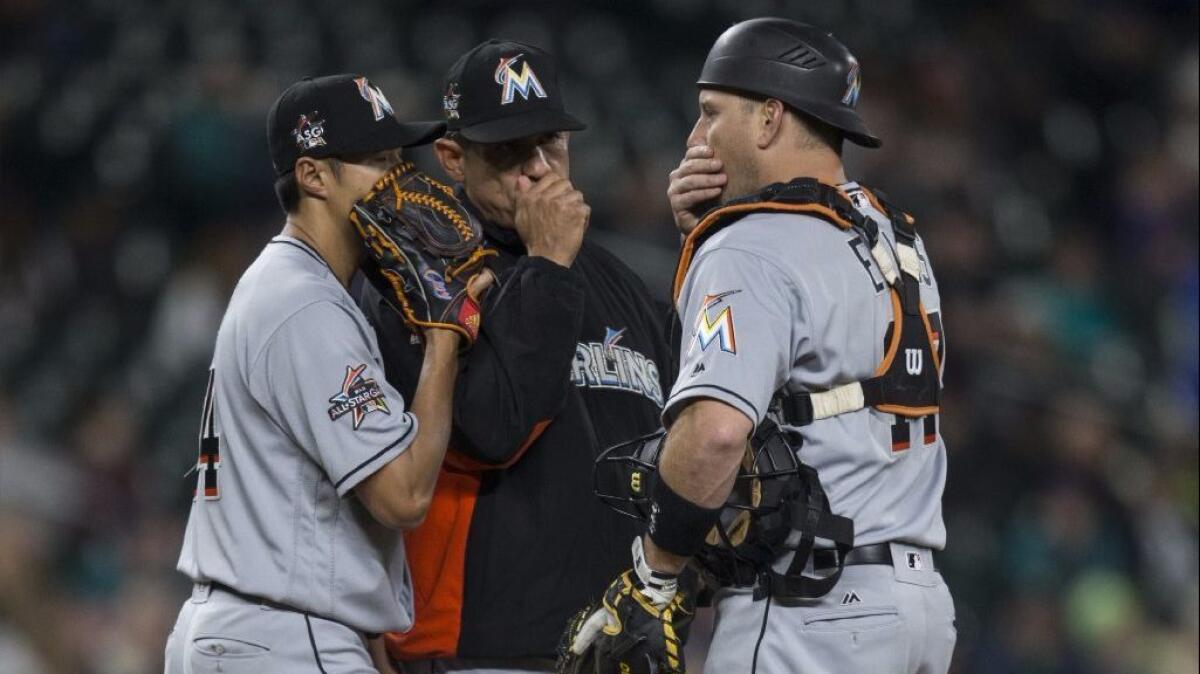Manager Don Mattingly has to be decisive in Miami while sale of the Marlins hangs in the balance

Reporting from SAN DIEGO â The anchors of his professional life might be about to be kicked out from under him, but Don Mattingly was a man at ease as we sat and chatted. He had an air of serenity about him, really.
We were talking about the looming sale of the Miami Marlins, and how the manager of the team has to steer his players through the choppy waters of uncertainty, and after a few words Mattingly let out a little chuckle.
âHaving been through that âŚâ he said.
He did not finish the sentence, but he did not need to. The mischievous twinkle in his eye said it all. As his old New York Yankees buddy Yogi Berra said, itâs dĂŠjĂ vu all over again.
Five years after Mattingly led the Dodgers clubhouse through a sale and its aftermath, he gets to reprise that role in Miami. This might be the rare case where âuniquely qualifiedâ is an understatement.
The star-studded list of interested bidders has included Derek Jeter, Alex Rodriguez, Tom Glavine, the brother of President George W. Bush, the brother of President Trumpâs son-in-law, and former Republican presidential nominee Mitt Romneyâs oldest son, who had a brief and forgettable stint as the Dodgersâ marketing guy under Frank McCourt.
The Marlinsâ sale saga has dragged in part because, according to a prominent sports investment banker, outgoing owner Jeffrey Loria initially put a $1.8-billion price on the undistinguished franchise. On Tuesday, after Bloomberg first reported Jeter and former Florida Gov. Jeb Bush had partnered on an agreement to buy the team for $1.3 billion, it turned out that Jeter and Bush donât yet have the money to back it up.
Weâll see if Jeter becomes the Marlinsâ savior, or if he becomes their version of Steve Garvey, who told the world he would buy the Dodgers but never formally put down a bid.
Either way, the drama could drag on for months, with the Marlins trying to win all the while.
A.J. Ellis, the teamâs backup catcher, played for the Dodgers during their sale saga. He has been approached by younger teammates, nervous about what the next few months might hold. Ellis has done his best to offer reassurance, telling them new owners generally want to come in and evaluate the organization before making major changes, but he understands the anxiety.

âThat uncertainty, at this stage, is definitely hanging,â Ellis said. âThereâs so many guys here who have been with the Marlins their whole life. Thatâs all theyâve ever known. It could be a huge life change for them.â
Ellis got his chance to start for the Dodgers in 2012, after McCourt had taken the team into bankruptcy and the front office wasnât sure it could commit $4 million to Rod Barajas. The Dodgers were sold to Guggenheim Baseball Management one month into the season, and three months later the new owners assumed $250 million in player contracts to make sure they could get Adrian Gonzalez.
Hanley Ramirez came that year too, and Zack Greinke the following winter, and Yasiel Puig came up from the minor leagues the following season. Andrew Friedman came in as president of baseball operations a year and a half later, and he shifted roster turnover into overdrive.
Mattingly managed one year under Friedman, then left for Miami, replaced by Dave Roberts. As it turned out, the identity of the manager mattered less in getting through to Puig than a ticket to Oklahoma City did.
Justin Turner said last year that, while he liked playing for Mattingly, he found the manager ânonconfrontational.â
Said Turner: âHe didnât enjoy, it seemed like, taking care of things right away. I think some things lingered too long and ended up turning into bigger things and issues.â
That could be a bigger risk in Miami, where the players are younger and less likely to police themselves, but Ellis said this yearâs Marlins are as cohesive as any team for which he has played. He said Mattingly is the same man he was in Los Angeles, but not the same manager.
âHe still has the same humility he always has, which is a trait that is so attractive in a manager and in a leader,â Ellis said. âWhat Iâve seen from him is a growth in confidence, his decision-making, his decisiveness, his ability to know when to be a little more confrontational, his ability to know when to pull back with a guy.
âI donât think things fester as long. We all learn from things we did in the past â things we have done right, things we wish we would have done differently. Thereâs a confidence there now.â
Mattingly is not particularly comfortable with this line of questioning. He does not find it an outdated notion that players should conduct themselves professionally and hold one another accountable, without the manager needing to intervene.
On the other hand, he acknowledges that the younger roster in Miami requires him to be a more proactive teacher.
âItâs a group of guys that has played together and know each other,â Mattingly said. âI think they feel theyâre good, which has nothing to do with me. They want to get better.
âTheyâve trusted us, to allow us to get better, and to keep teaching, and keep molding, and to say, âThis is the way you have to play the game if you guys want to win.â Theyâve been very receptive. L.A. was receptive, I just think sometimes you âŚâ
And here Mattingly paused. It was as if he had suddenly heard enough about what might have gone wrong with the Dodgers, enough about how he ran the clubhouse, and ran the bullpen, and ran a game.
The bottom line is not the process. The bottom line is the results, and the Dodgers had a winning record in each of Mattinglyâs five years as manager â one with the Dodgers in bankruptcy court, one with the team on the auction block, and the last three as National League West champions.
The long pause ended, and Mattingly did not bother to finish the sentence.
âHonestly, it worked,â he said. âYou didnât get where you wanted to go, but you got into the party, and thatâs really what youâre looking for every year. Thatâs what we were able to do my last three years, and thatâs what Dave was able to do too.
âAt some point, youâre going to crack through â the ball is going to bounce your way, youâre going to get that out when you need it, youâre going to get that hit when you need it. Then you bounce to the next level and you win.â
Tim Wallach, who coached for Mattingly in Los Angeles and followed him to Miami, said he sees a manager relaxed, content and practiced in tuning out the turbulence.
âHe just seems in a really good place,â Wallach said.
Heâs in the Eastern time zone, a huge plus when his wife Lori lives in Indiana with their two-year-old son Louis and her teenage kids. Itâs not as if Lori could stay up and watch the Dodgers when Louis was a newborn and the games started at 9:10 p.m. in Indiana.
âShe couldnât talk about whatever the next day,â Mattingly said, âbecause she had no idea what happened.â
The blended Mattingly family has six kids. By the summer of 2018, all but Louis will be out of the house, and Lori and Don no longer will need to count down to spring breaks, summer visits and the off-season.
âWeâre a year away from being together all the time,â he said.
That might not be in Miami.
When the Dodgers were sold, the new owners eventually came for the guy whoâd hired Mattingly. The general manager, the manager, the coaches, the scouts, the trainers: itâs almost an all-new cast in L.A., and all that change amid a run of division championships.
The Marlins are 14 years removed from their last postseason appearance, and the outgoing owner is a longtime friend of Mattingly.
Mattingly is a proud man, and not at all scared.
When the Dodgers did not announce that his option for the 2014 season had vested when the team won a playoff series in 2013, Mattingly announced it â at a news conference the Dodgers had planned for other purposes â and demanded a long-term contract. He got it.
When that contract expired and Friedman offered him a chance to stay but did not offer a long-term commitment, Mattingly walked away, and he got that long-term commitment from the Marlins.
So, when Jeterâs name surfaced as the Marlinsâ potential new boss, Mattingly did not call to inquire about his job security. They respect one another but they are not best buddies; their Yankees careers overlapped for 15 games.
The Dodgersâ sale triggered a management change that compelled Mattingly to leave the team for a job with more security. He is barely a year into that job, the Marlins are for sale, and here we go again.
âThat doesnât bother me,â he said. âI never worry about that. Iâm here. I love it.
âIf they donât love me, Iâll do something else.â
Follow Bill Shaikin on Twitter @BillShaikin
More to Read
Go beyond the scoreboard
Get the latest on L.A.'s teams in the daily Sports Report newsletter.
You may occasionally receive promotional content from the Los Angeles Times.











